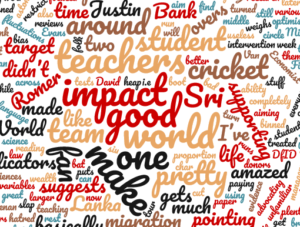Hi all,
This morning, I was having a chat with an Australian cricket fan. England were about 70 runs off their target with 16 overs to go, and I commented on the inevitability of England’s victory. His reaction was totally different, pointing out that 16 overs was plenty of time to get 7 wickets. I was amazed at that, that there are sports fans whose experience of life has not been crushing disappointment and the gradual erosion of all their hopes and dreams. I pointed out that Sri Lanka were at that moment enjoying the innings break after Bangladesh had made 321, and thinking I was demonstrating textbook pessimism, I predicted we’d make about 182 in response. We made 157. Imagine supporting a team so bad that they make your pessimism turn into optimism. Such is the life of the Sri Lankan cricket fan.
- That intro isn’t solely designed to confuse and alienate the cricket illiterates. It’s also a pretty good metaphor for supporting team migration. We have two of the best batsmen out there in Michael Clemens and Lant Pritchett, and various other players of good repute, but policy just refuses to follow along. FiveThirtyEight document the rightward lurch the immigration debate has taken in the US, one that mirrors the rest of the world. You can satisfy your curiosity about the change in migration law around the world in the last 30 years at the IMPIC (Immigration Policies in Comparison) project website now.
- Paul Romer continues to throw stink bombs around the World Bank offices, this time taking aim at the Doing Business indicators. At first it sounded like he was alleging malpractice reflecting a political bias in the Bank; he later clarified that this was not the impression he was trying to make. Nevertheless, the brouhaha prompted two good responses. First, Alan Gelb and Vijaya Ramachandran suggest three pretty sensible fixes to improve the indicators, but they probably didn’t run them by their colleague Justin Sandefur, who pretty much suggests they be binned, pointing out much larger fluctuations than the one Romer focused on, Chile. Justin basically suggests that the entire middle 80% of the rankings is useless.
- “There is no impact on student tests in language, mathematics, or science. There is no average impact between treatment and comparison schools. There is no impact if we restrict analysis to students of eligible teachers only. There is no impact using instrumental variables (i.e., treatment on the treated). There is no evidence of heterogeneous impacts across student wealth or student ability or proportion of teachers who are target teachers.” David Evans reviews a paper that completely puts the boot into an intervention aiming at improving teaching by paying teachers better, basically indiscriminately.
- I’ve been reading a heap of stuff about management this week, and I still think this is one of the best-developed research areas that donors have least well turned into good interventions. For those of you unfamiliar with the work of the World Management Survey, John Van Reenan offers a whistle-stop tour here.
- Workers’ lunches around the world. Unsurprisingly, the Pret ‘variations on a theme of depression in bread’ sandwich range doesn’t make the cut; astonishingly, neither does char siu fan. Anyone advocating for huel gets a slap.
- DfID folk will like this: The Economist weighs in on the worst airports in the world. While South Sudan gets a real kicking, I am amazed they didn’t find any hatred in their hearts for Kenya’s circle of hell – one of the most soul-destroying experiences I’ve had, notwithstanding watching this Sri Lanka team bat.
Have a great weekend, everyone!
R

